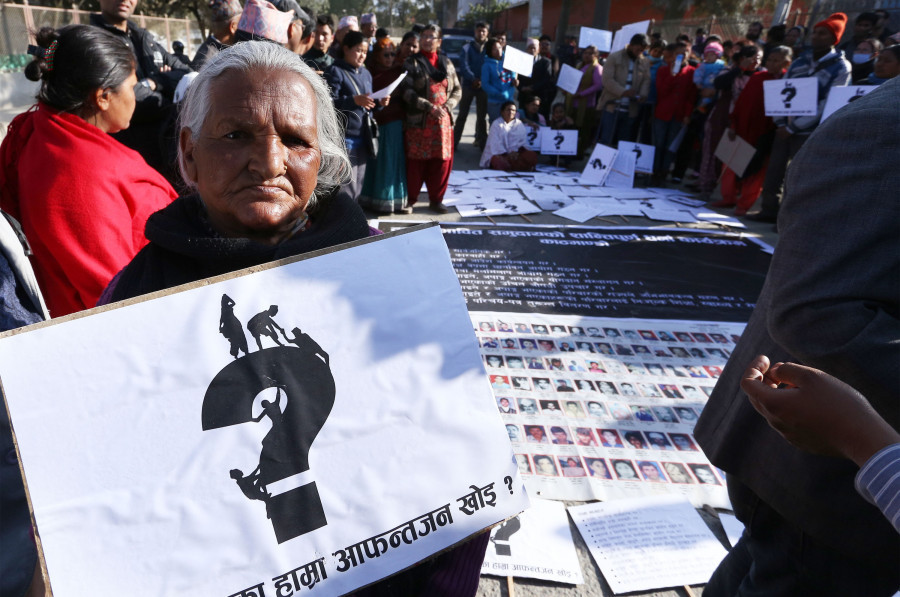National
Disappearance Commission suggests relief packages for conflict victims
There are fears Covid-19 may present an excuse to further delay investigation into war-era cases of rights violations.
Binod Ghimire
Amid criticism that the Commission of Investigation on Enforced Disappeared Persons hasn’t done anything concrete towards delivering justice to the victims, the special-purpose panel has urged the government to provide relief for the victim’s family.
In its written request to the Ministry of Law and Justice, the commission has said immediate relief is necessary for the families of the victims of forced disappearance to save them from hunger, a potential threat as the pandemic continues. The commission says that most of the victims of enforced disappearance are economically weak and have lost their jobs due to the lockdown triggered by the Covid-19 pandemic.
“Most of the victims’ families relied on daily wages or on foreign employment for their earnings. However, the pandemic left most of them unemployed,” reads the letter addressed to the ministry. “The loss of jobs has pushed them into difficulties even to meet their daily needs. It is the responsibility of the state to support its citizens in the time of crisis.”
The recommendation, according to the commission, was made after an interaction with the families of the victims who have filed complaints at the commission. Among the 3,223 complaints registered with the commission, investigation is going on into 2,506 after a study that other complaints did not fall within its jurisdiction.
Lila Devi Gadtaula, a spokesperson for the ministry, said they have received the request but have not taken any decision on the matter yet. “We will have to study and decide if that is doable,” she said.
Officials at the commission say victims’ families have been suffering economically for years as most of those who were forcibly disappeared were the breadwinner. The pandemic has compounded their problems.
Gangadhar Adhikari, a spokesperson for the commission, said the loss of income opportunities has not just crippled them economically but also left mental and physiological impacts on them.
“The government should immediately provide relief so that the victims can sustain themselves at the time of crisis,” Adhikari told the Post. “The amount should be fixed looking at the state coffers.”
The government provided Rs 1 million each to the families of the deceased and forcibly disappeared persons during the decade-long Maoist insurgency, in different instalments. The Enforced Disappearance Enquiry, Truth and Reconciliation Act-2014 authorises the two transitional justice commissions to recommend reparations worth up to Rs 300,000 to each victim’s family.
The victims and human rights defenders, however, say that the amount is too little. They have asked for raising the ceiling for reparation.
Representatives of victims’ organisations say it is a welcome decision from the disappearance commission, which the government needs to address immediately. They want the Truth and Reconciliation Commission to follow suit.
“Everyone is affected by the pandemic. However, the suffering of a victim’s family is even worse,” Suman Adhikari, former chairperson of the Conflict Victim’s Common Platform, told the Post. He said that the relief package, however, shouldn’t be an excuse to delay the justice delivery process.
The Covid-19 pandemic and the lockdown has come as an excuse for the two commissions to further delay investigation into the war-era cases of human rights violations. Five years since their formation, the two commissions have little to show about justice delivery other than receiving complaints from the victims and their families.
The two commissions have received over 67,000 cases in total including 63,718 complaints addressed to the Truth and Reconciliation Commission alone.
Adhikari, the spokesperson for the disappearance commission, said they know that monetary package is just short-term relief and their duty will not be accomplished without recommending action against the perpetrators.
He said the commission has reminded Law Minister Shiva Maya Tumbahangphe to prepare an amendment to the Transitional Justice Act and ensure that it is endorsed by the upcoming winter session of federal parliament. The winter session, also called bill session, normally commences in December.




 19.12°C Kathmandu
19.12°C Kathmandu














